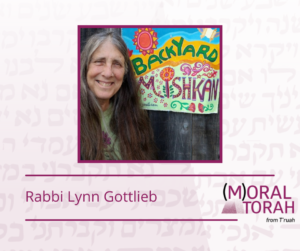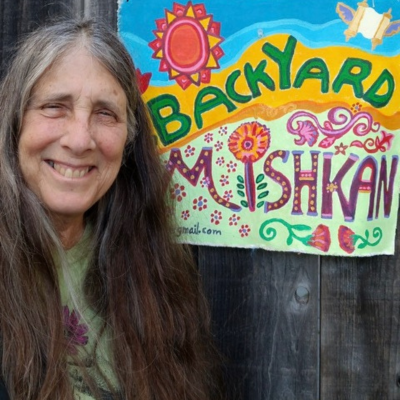A D’var Torah for Tisha B’Av by Rabbi Lynn Gottlieb
(originally published 2022)
“Zachor…Mah Haya Lanu! Remember what happened to us!”
This quote from the liturgy of Tisha B’Av, written in the 12th century by Baruch ben Shmuel of Mainz, expresses how many of us are feeling this season. Tisha B’Av initially commemorated the destruction of the Temple in Jerusalem in 586 BCE and again in 70 CE, known in Hebrew as Churban HaBayit/Destruction of The House. Over centuries, it expanded to include commemoration of the forced exile of Sefardic Jews from Spain and Portugal, European pogroms, and the Holocaust, initially called Churban before the term Shoah came into use.
The Hebrew term Churban denotes catastrophic destruction on a vast scale through human agency. And it is not our historic catastrophes alone we are mourning this year. The deadly set of rulings promulgated by the Supremely right wing Court impacting the bodies and well-being of women, girls and trans people, the sovereignty of Indigenous people, the health of the environment, the lives of Black people, freedom of religion, the right to boycott, and free speech compound the sense of emotional overwhelm present in our communities at this time. How then, might we wield our mourning technologies to meet the needs of the times we live in?
Sign up to receive (M)oral Torah in your inbox each week.
From earliest Jewish times, communal mourning also included teshuvah. For instance, we associate the prayer Avinu Malkeinu with the High Holidays, but the Talmud, in tractate Ta’anit (25b) – about public fast days and mourning practices – describes when Rabbi Akiva created it during a drought, i.e. a time of public mourning and repentance.
Teshuvah carries the meaning of return to wholeness through acts of repair. In the 12th century, Maimonides famously defined it as a five step process. Here is my updated interpretation of his definition, through a reparations framework: Teshuvah requires acknowledgement of harms (hakarah), remorse (charata) – which, in a reparations framework, is a form of accountability for the harms – and public truth telling of harms by people directly impacted by them. Often, we are tempted to think that is enough, that we feel bad and apologize, but Maimonides argues that is not so. The last two steps – compensation (peira’on) and guarantees of non-repeat of the harm (azivat ha-chet) – are needed for teshuvah reparations to be complete to the satisfaction of injured parties. For the massive harms of colonial settlerism, racism, patriarchy, environmental destruction and, in the Jewish world, Israeli occupation, we need to implement these final two stages. It is not enough to mourn. Mourning must be accompanied by actions that end the harm being done.
To what can this be compared? Several years ago I saw Nancy Pelosi wash the feet of migrants who walked the treacherous road from Honduras to the United States to escape violence and climate devastation. As the Speaker of the House washed their feet, she shed tears of sorrow for their plight. In my understanding of faithfulness, however, you can’t wash the feet of traumatized immigrants with one hand and use the other hand to sign off on massive military spending, which is the root cause of the harms that led them to leave their homes in the first place!
Find more commentaries on Tisha B’Av.
So it is with us. For the sake of a healed future, we cannot silo our grief from our teshuvah. The two go hand in hand. Humanity’s fate is tied together.
This Tisha B’Av, along with the ancient words of Baruch ben Shmuel, I will recite the words of Honduran human rights worker Berta Caceres, who was murdered defending her community’s access to clean water. She said, “In the indigenous world view, we are beings who come from the Earth, from the water, and from corn. Let us wake up! Wake up, humankind! We’re out of time. We must shake our conscience free of the rapacious capitalism, racism and patriarchy that will only assure our own self-destruction…  Our Mother Earth, militarized, fenced-in, poisoned, and a place where basic rights are systematically violated, demands that we take action. Let us build societies that are able to coexist in a dignified way, in a way that protects life. Let us come together and remain hopeful as we defend and care for the Earth and all of its spirits and living beings.”
Our Mother Earth, militarized, fenced-in, poisoned, and a place where basic rights are systematically violated, demands that we take action. Let us build societies that are able to coexist in a dignified way, in a way that protects life. Let us come together and remain hopeful as we defend and care for the Earth and all of its spirits and living beings.”
Rabbi Lynn Gottlieb is entering her fiftieth year of rabbinic service. She is author of She Who Dwells Within; A World Beyond Borders Passover Haggadah; and Trail Guide to a Torah of Nonviolence. Her newest book, Way of the Mishkan: A Ceremonial Guide to Reparations and Indigenous Land Back Teshuvah will be available this fall, along with her new theater piece, Maggida on Sacred Ground. Lynn lives in Berkeley, California on unceded Ohlone land. She is board chair of Interfaith Movement for Human Integrity and on the rabbinic council of Jewish Voice for Peace.

